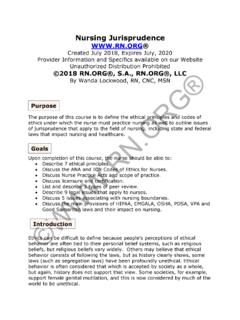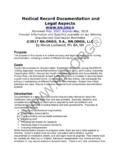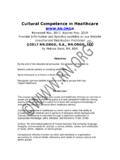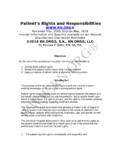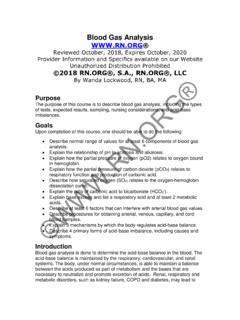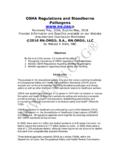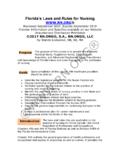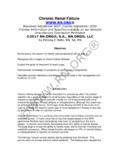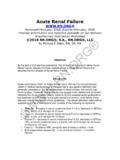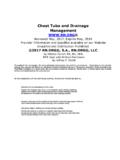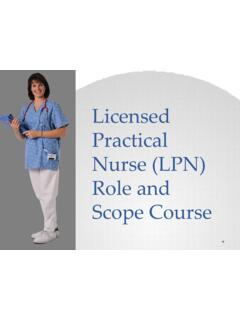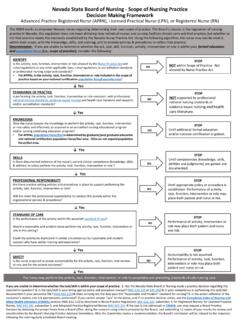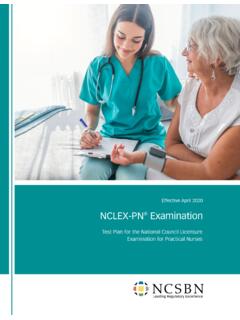Transcription of Nursing Ethics - - RN.org®
1 Nurses Code of Ethics Reviewed February, 2018, Expires February 2020 Provider Information and Specifics available on our Website Unauthorized Distribution Prohibited 2018 , , , LLC By Melissa K Slate, RN, BA, MA Objectives By the end of this educational encounter, the nurse will be able to: 1. Identify ethical issues in Nursing practice 2. Describe the role of nurses in the ethical practice of health care 3. Recall principles of the Code of Ethics Purpose: This course is intended to give the nurse an overview of the Nurse s Code of Ethics , and assist the nurse in developing his or her own practical ethical decision making skills.
2 Ethics - Rules of conduct recognized in respect to a particular class of human actions or a particular group. The American Nurses Association wrote the Code of Ethics for Nurses in order to serve the following purposes: As a statement of the ethical obligations and duties of every person who chooses to enter the profession of Nursing . To act as the nonnegotiable standard of Ethics To serve as an expression of the understanding on Nursing s commitment to society. The Code of Ethics is a dynamic document that is constantly changing. As the morals and values of society change, the document changes to reflect those morals and values.
3 There is also an International Code of Ethics for Nurses that closely parallels the premise of the ANA Code of Ethics . The need for Nursing care is Universal and within the provision of Nursing care are basic inherent principles that provide the framework for Nursing practice. The ANA Code of Ethics has nine provisions grouped into three general areas while the International Council of Nurses Code of Ethics is grouped into four distinct areas. These four distinct areas define the responsibilities of the individual nurse and Nursing as a whole. The four areas are: to promote health, to prevent illness, to restore health, and to alleviate suffering.
4 Nursing also embraces human rights and provides care without regard to conditions of race or culture. In Nursing , the patient may be an individual, a family, or a community (ICN). The three distinct areas of the American Nurses Association Code of Ethics are involved with the fundamental values and commitments of the nurse, the boundaries of duty and loyalty, and duties beyond individual patient encounters (ANA). Provision 1. The nurse, in all professional relationships, practices with compassion and the recognition of human dignity and worth that is present in every individual. Respect for human dignity.
5 In the provision of care, the nurse respects the beliefs and customs of the individual, family, or community. The nurse takes into account the values and needs of all persons in the professional relationship. Relationships to patients. The need for health care is universal regardless of the unique differences of each patient. The nurse establishes therapeutic relationships with patients and administers Nursing care that respects the unique differences of the patient. This includes considerations of lifestyle, value system, and religious beliefs. Respect for the values and beliefs, of the patient, does not imply that the nurse condones those beliefs or practices on a personal level.
6 The nature of health problems. The nurse does not allow the disease, disability, or functional status of the patient to determine the individual s worth. The nurse respects the rights, dignity, and worth of all those who require Nursing services for support, comfort, health restoration, or health promotion and prevention. The nurse plans and individualizes care to allow the person to live with as much physical, spiritual, social, and emotional well-being as possible. This care extends to the families of the patient and continues across the health continuum. This is especially important as the patient and family traverse the various processes at the end of life.
7 Nurses act as advocates for the patient and family, assessing the responsible and appropriate use of life-sustaining care in accordance with the wishes of the patient and family. The nurse serves as a guide, helping to provide complete and appropriate information without bias or the inflection of personal values and beliefs upon the patient. The nurse provides pain management and the provision of comfort to the patient even though those measures may hasten death. The emphasis is on avoiding needless pain and suffering in the dying process, however, the nurse does not act with the sole intent of ending a patient s life regardless of the benevolence of the intentions.
8 The invaluable experience of nurses in care at the end of life should be used to assist education, research, practice and the development of policies. The right to self-determination. Respect for human dignity requires that the nurse acknowledge and understand that the patient has certain rights and one of the foremost rights is the right to self-determination. Self-determination is also called autonomy and forms the basis for informed consent within the healthcare system. Patients have the right to decide what is to be done with and to their own person and part of that right involves the right to have the information and facts necessary to make an intelligent and enlightened decision regarding health care decision making.
9 Patients have the right to assistance in weighing the benefits and risks of treatment or the refusal of treatment without any inflection of the morals, values, or beliefs of the nurse in the decision making process. The nurse should uphold and encourage the participation and planning of the individual in the decision making process to the extent that they are willing and able to participate. Nurses have an obligation to be aware of patient rights and to advocate for the patient in the provision of those rights. The nurse also has a duty to assess the understanding of the patient regarding information presented and to further clarify or explain information given so the patient has a clear understanding of that information.
10 If the patient is unable to make decisions, then a surrogate decision maker should be sought. If a surrogate is not available, then decisions should be made on behalf of the patient, following the patient s wishes in as far as they are known and the decisions should be made with the best interest of the patient in mind. The nurse also recognizes that individuals are members of a community and that there may be situations in which the benefits of the community at large outweigh the patient s right to autonomy, such as when issues of the public health are at stake. Limitation of individual rights is always a deviation from the standard of care and is justified only when a less restrictive means of preserving the greater good is not available.
